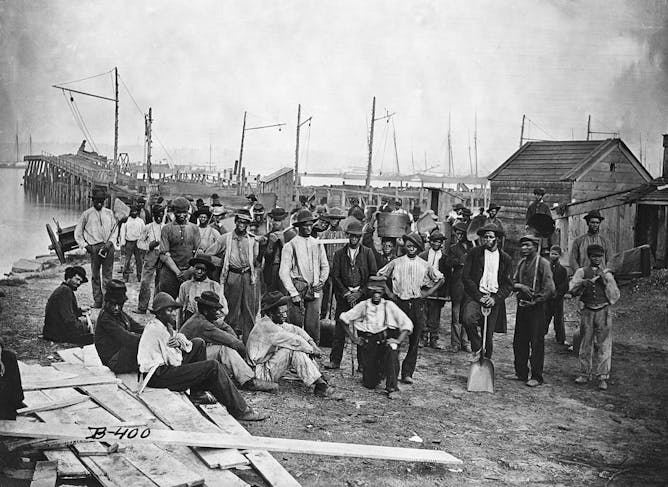|
|
|
|
Happy Sunday − and welcome to the best of The Conversation.
Here are a few of our recently published stories:
As the economy and business editor at The Conversation U.S., I didn’t always find the time to read all the many stories our team publishes. But in my new role, taking over from my esteemed colleague Emily Costello, I’ve endeavored to do just that. And I’m continually amazed – and humbled – by the thoughtful, surprising and exceptional articles written by scholars but painstakingly edited by my talented colleagues. Last week’s top stories are a case in point.
The week began with ongoing coverage of the tragic wildfires in Maui, and environment + climate editor Stacy Morford led the way with several insightful pieces she edited, including one highlighting the lingering human health risks from burning chemicals. Senior religion + ethics editor Kalpana Jain helped broaden our coverage by commissioning a unique take that explored the damage to Native Hawaiian sacred sites.
We also followed the fourth Trump indictment, which senior politics + society editor Naomi Schalit had been preparing to cover for over a month. Her team stayed up until midnight Monday waiting for the details to appear on the Fulton County website. And they quickly put out several scholarly stories – including this one – that explained the new charges and provided important context.
Beyond breaking news, we published many other fascinating articles throughout the week, from the science of carbonization, handled by assistant science editor Mary Magnuson, to a thought-provoking look at the skills enslaved Africans brought to America, deftly edited by education editor Jamaal Abdul-Alim and Jusneel Mahal, one of our outstanding summer interns.
I hope you enjoy reading these stories as much as I did.
|

|
Bryan Keogh
Managing Editor
|
|
Readers' picks
|

Manufacturers inject carbon dioxide into beverages to make them fizzy.
Jenny Dettrick/Moment via Getty Images
Michael W. Crowder, Miami University
Ever wonder how soda manufacturers get the bubbles and fizz inside the can? A chemist explains some of the science behind the carbonation process. Hint − it involves carbon.
|
|
|
-
Rosalyn R. LaPier, University of Illinois at Urbana-Champaign
The region of Maui has been revered by its Indigenous peoples as a sacred place for generations. It is believed to be the home of Kihawahine, a woman who transformed into a goddess.
-
Andrew J. Whelton, Purdue University
Maui County issued an ‘unsafe water’ alert and urged precautions. Residents can face several toxic hazards from fires, as an expert in the chemical risks from fires explains.
-
Charles R. Hunt, Boise State University
The framers decided that members of both the House and Senate would be required to be “an inhabitant” of the state they represent.
-
Vasudha Narayanan, University of Florida
Oppenheimer’s knowledge of Sanskrit literature was more than cursory. He used quotes and parables from Sanskrit texts as a guide to right actions in his life.
|
|
Editors' picks
|

Enslaved Africans built landmarks like the White House, the U.S. Capitol and New York’s Wall Street.
Bettmann via Getty Images
Rodney Coates, Miami University
While a Florida curriculum implies that enslaved Africans ‘benefited’ from skills acquired through slavery, history shows they brought knowledge and skills to the US that predate their captivity.
|
|
|
-
Emily Lindsey, University of California, Los Angeles; Lisa N. Martinez, University of California, Los Angeles; Regan E. Dunn, USC Dornsife College of Letters, Arts and Sciences
New findings from the La Brea Tar Pits in southern California suggest human-caused wildfires in the region, along with a warming climate, led to the loss of most of the area’s large mammals.
-
Anthony Michael Kreis, Georgia State University
Fulton County District Attorney Fani Willis’ RICO charges against Trump are targeting election law violations, but by another name. The charges can result in a minimum five years in prison.
-
Steven Berkowitz, University of Colorado Anschutz Medical Campus
Millions of young people in the US are suffering, whether from abuse at home, pressure from social media or exposure to violence. But navigating the mental health care system can be disheartening.
-
Calvin Schermerhorn, Arizona State University
Florida’s new standards for teaching social studies include throwbacks to an interpretation of slavery as benign or inconsequential.
|
|
|
|
|
Like this newsletter? You might be interested in our other weekly emails: About The Conversation: We're a nonprofit news organization dedicated to helping academic experts share ideas with the public. We can give away our articles thanks to the help of foundations, universities and readers like you. Donate now to support research-based journalism
|
| |
| |
| |
| |
|
|
|
|
|
|
|